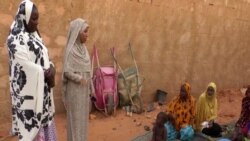Niger has one of the highest known child marriage rates in the world, with three out of four girls in this West African country married before age 18. But some girls are refusing this traditional cultural practice and are being helped by women who were themselves forced into child marriage.
Balkissa Chaibou, 24, meets twice a month with Nigerian girls to discuss their right to oppose arranged marriage.
The United Nations says three out of four girls in Niger are married before age 18.
Chaibou is taking a stand against child marriage because she herself was forced to marry at the age of 12 and drop out of school.
Balkissa said her awareness is to give information to young girls. They need to know what they want, know where they want to go, and what to do to get there. She argued, if the girls know their goals, their ambitions, they will know where to go and how to get there. They need to know that they always have a choice — the choice to say no.'
Chaibou became a medical student after having her marriage annulled.
But it took five years of fighting against her parents, and the support of police and an aid group.
One such group, SOS Women and Child Victims of Violence, has helped thousands of Nigerian girls escape forced marriage.
Mariam Moussa, coordinator of SOS Women and Child Victims of Violence, said the NGO often grabs the public prosecutor's attention. By doing this, he then forces the parents to renounce the marriage and makes them sign a commitment that they will not marry off their daughter.
But the fight against child marriage in countries like Niger, one of the poorest in the world, is not easy.
With limited incomes, many parents focus on boys' education and marry off their daughters early.
Niger's President Issoufou Mahamadou, at the July 7 African Union summit in Niamey, vowed to boost prospects for girls.
He said the employability of girls need to be strengthened. The girls must have access to a job. They have to finish school with a career. That's what can make it easier for them to find a job. That's what can allow them to be more autonomous.
For her part, Chaibou urges girls to spread the word to their friends that nobody can force them to marry, and they have the right to remain children.









